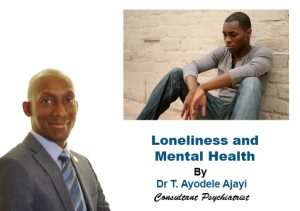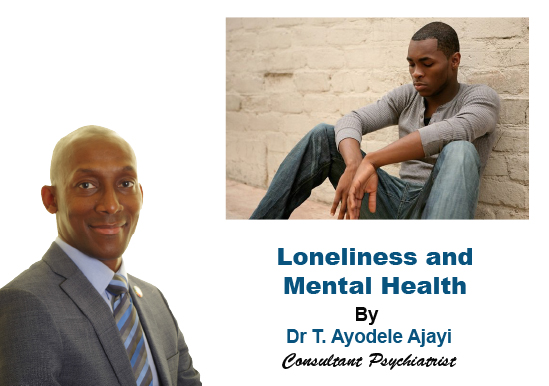Loneliness and Mental Health
A community approach to tackling loneliness to promote mental well-being
The theme for the UK Mental Health Awareness Week in May was “Loneliness”. This was rightly so given the adverse impact that the pandemic and lockdown have had on global mental well-being. Loneliness is a complex and unpleasant emotional response to perceived isolation. It has also been described as a “social pain” – a psychological mechanism that drives us to seek social connections. In simple terms, it is when an individual perceives themselves to be getting less social contact than they require to thrive and live a healthy, whole, happy life. We are all unique in how much social contact we need to meet our needs. The longer loneliness persists, however, the more likely it is to negatively impact on both our physical and mental health. Loneliness results from several reasons with no single approach to tackling it.

Social isolation is a related, but a different concept. This is when someone has a smaller number of social contacts, and this is measured by how many relationships they have.
Loneliness – Who
In February 2021, about 3.7 million adults in Britain reported feelings of being often or always lonely, which equated to about 7.2% of the population. These figures suggest that the pandemic and lockdown resulted in worsening loneliness as the 2016/17 statistics showed that 5% of the population was affected. The largest loneliness survey ever carried out, which was conducted by the BBC 4 in conjunction with a few academics across the UK gathered data from 55,000 subjects globally. The findings identified 16 to 24-year-olds as the worst affected age group. The additional risk factors include being widowed, unemployed, living alone or in rented accommodation; and living with a long-term health condition or disability. Other vulnerability factors include being a carer and from an ethnic minority or LGBTQ community are other vulnerability factors.
Loneliness- What
Loneliness has a complex relationship with mental illness. Being lonely not only predisposes to anxiety and depression but also to worsens the severity of the latter. Certain mental health disorders can cause withdrawal from society culminating in loneliness. The persecutory thoughts associated with psychosis, the social aversion with anxiety; and poor motivation and lethargy of depression can all result in loneliness from forced diminished social contacts. Similarly, loneliness is associated with an increased risk of certain long-term physical health conditions including diabetes, strokes, and heart conditions. Remarkably, loneliness is linked to s reduced life span and a 50% increased risk of dementia. The American Centre for Disease Control opines that the risk of loneliness rivals that of smoking in its impact on health.
Loneliness -How
An approach to tackle loneliness is to adopt both a personal and community strategy. Keeping active through physical exercises which could include joining the gym, praise aerobics, and going on regular walks are part of personal intervention. Keeping the mind busy through stimulating content such as listening to podcasts or watching educational videos; making the best use of daily encounters such as with the postman or local grocers; and spending time in nature and with pets are other ways to combat loneliness. Learning a new skill, starting a course or volunteering are other ways to overcome loneliness.
Look, Listen, Love, Learn and Lead
A community approach to combat loneliness is to adopt a Tripart strategy that looks out for, listens to, loves on, learns from; and leads the lonely out of their hideaway into a safe, sensitive, space. Looking out entails intentionally being more aware of and seeking out those who may be vulnerable in society. Listening to the lonely involves an undivided, empathetic attention. Stephen Covey identified 5 levels of listening as ignoring, pretending, selective, attentive, and empathetic listening. In my view, undistracted time to listen is one of the most precious gifts one human can offer another. Listening means creating a safe, sensitive, space for the lonely to be heard without fear of judgement and rejection.
Loving relationships have a positive impact on mental and physical well-being. It is associated with better stress management, reduced anxiety and depression, and increased happiness and life satisfaction. Those in loving relationships live longer and have better outcomes in the face of severe physical illnesses such as cancer and heart attack.
As regards to learning, what can we as a society learn about and from the lonely to alleviate their suffering? What can we do in our churches and Christian communities to be more friendly and accommodating to the needs of the lonely?
Could looking out for, listening to, loving, and learning from the lonely, lead to a trusting safe relationship that can be leveraged to cautiously lead them out back to the community? Trusting relationships are crucial to breaking the cycle of loneliness, and they take time to build.
Email me your thoughts at tripartcare@gmail.com
or join our next Tripart Care Hub https://tripartcarehub.eventbrite.co.uk



